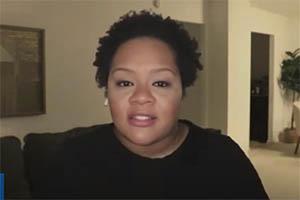Communications
Yamiche Alcindor Tells Students Covering Trump Is Like Covering a Hurricane

Earlier this month, PBS NewsHour’s White House Correspondent, Yamiche Alcindor, took part in a virtual event hosted by the American University School of Communication (AU SOC), Kennedy Political Union (KPU), and The Blackprint, an AU publication which highlights stories that are important to students of color. The conversation was moderated by SOC professor Jane Hall and included a Q&A portion for student media leaders and editors to ask questions. Watch clips from the live event.
Yamiche Alcindor spoke about her experience as a journalist covering President Trump’s presidency and her experience as a civil rights journalist. As she puts it, covering the Trump presidency is different than covering other administrations. "What I do know is that I covered hurricanes, and I covered all sorts of mayhem as a breaking news reporter and this feels - very chaotic. It feels like every day is different." Alcindor was inspired to get into journalism by coverage of the story of Emmet Till, a 12-year old young Black boy who was murdered in Mississippi in 1955. She explained, "As a result, covering President Trump, to me, is just like covering history," and it allows her to focus on "posing questions that everyday Americans want the answers to." She hopes that no matter what Americans may be going through that they can see their issues and concerns being highlighted and reflected through her work.
Alcindor also touched on the importance of fact-checking President Donald Trump. She said "I think really interacting with the president in a respectful way but in a way that tells the president. 'Hey, I have the information. I have my research right in front of you. Let's talk about the facts here.'"
Asked about the difference diversity and equity makes in newsrooms, Alcindor said that having a diverse team makes a newsroom smarter. She went on to say that she has always thought diversity was "the moral thing to do, to have a wide swath of people from all parts of the country and all sorts of life experiences." She specifically referred to how her personal experiences and relationships with others in her life have made her journalism better because she was able to learn from their experiences. From protests against racism, police brutality, and communities that are disproportionately impacted by the COVID-19 pandemic, Alcindor explained how valuable it is to know about the lives of those who may not usually have a voice.
Students were also able to ask Alcindor questions about her career and experience as a journalist.
Tori Powell, co-president of Visible, the first LGBTQ+ student publication at AU, asked Alcindor to share her thoughts about seeing the world jump in on conversations surrounding race this past year. Alcindor expressed how exciting it was to see so many people learning more and spreading more awareness through these conversations. She said, "There's so many of us that have been doing this work and covering social justice and equality in this country. So I think it's great to see it be something that is central to the way that we're covering this election and also the way that we're covering and healthcare and on so many other things." Alcindor went on to express how she is looking forward to learning and reporting more about pronouns, violence against Black trans women and healthcare in the trans community.
Alcindor underscored how journalists have always stuck together in response to a question from Sophie Austin, Editor-in-Chief of the AU student-run publication, The Eagle. She also shared a piece of advice she got from a professor about interacting with other journalists while preparing to cover the trial of George Zimmerman. It was simple: be nice to people around her. Alcindor added, "I think that's how solidarity is going to stick around. I think journalists understand, especially amid the pandemic, especially amid all that's happened in 2020, that we have a shared goal to educate and to tell the truth."
Tamir Harper, Fredrick Douglass Scholar and editor-in-chief of The Blackprint, asked Alcindor how she handles aggression from the Trump administration and for any advice she has for young journalists. "People are dying, people are out of work, people are stressed, out people are sad. They're grieving," said Alcindor. "So I think about that. I really take it to heart that I have the privilege to question the President of the United States and hold people accountable."
Alcindor advised young journalists to take care of themselves. "If you need to not go to class because you're upset because you watched George Floyd get kneeled on his neck for eight minutes and 46 seconds, give yourself that beat. Because I think in college, you can get so busy with school and with clubs that you don't take care of yourself apart from journalism." For students who consider themselves civil rights journalists, she encouraged them by saying, "If you are passionate about writing about race and social justice, make sure you find people and seek out people who will support you. But also, don't give up. Those stories are important."
